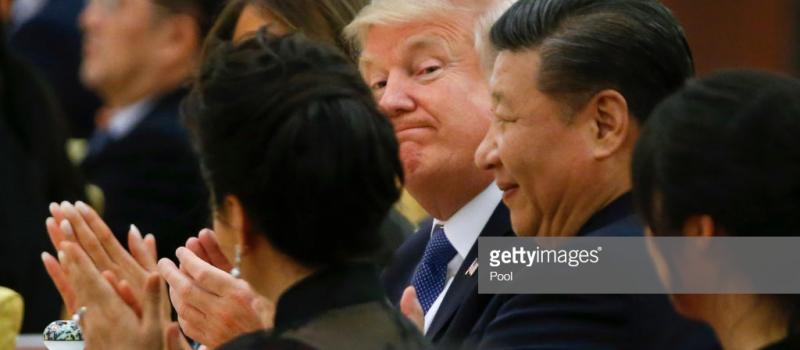Cautiously optimistic on the upcoming G20 Xi-Trump meeting
posted by Xi Sun on November 26, 2018 - 8:10pm

Has the “new Cold War” between the People’s Republic of China and the United States of America began? Pessimists argue that the tough speech on China made by US Vice-President Mike Pence at the Hudson Institute on October 4, 2018 was the dangerous sign.
During his recent visits to the ASEAN summit in Singapore and the APEC summit in Papua New Guinea, Pence further strengthened his hawkish tone on China by criticizing China's “One Belt, One Road” initiative and peddling the Indo-Pacific Strategy, with US allies Japan and Australia. Apparently, the distrust and divide between China and America are deepening, worrying the world.
Now, there is much anticipation and speculation surrounding the upcoming G20 Summit in Argentina, where Chinese President Xi Jinping and his US counterpart Donald Trump will meet on the sidelines of the summit to discuss the worsening trade conflict between the two countries.
Based on the rhetoric on display from both sides over the past several months, it would appear that neither leader will be inclined to back down publicly, since they have both backed themselves into a corner and do not wish to lose face with their citizenry. Envisioning a pathway for both to do so while genuinely ratcheting down the tension would appear to be less likely.
However, China and the US are both suffering as a result of the conflict and both leaders should be incentivized to find a palatable solution. Xi is under increasing pressure as a result of the sustained erosion of Chinese economic indicators. The country’s equity markets have lost nearly a third of their value over the past year and its currency yuan (RMB) has depreciated to values not seen in a decade. The Chinese economy is unaccustomed to such an assault; it functions well when GDP growth rate is at least 6.5% but is coming perilously close to breaching that red line.
Trump is also under pressure from America’s agricultural and manufacturing sectors, which have become too addicted to the Chinese market for decades. He is betting that his brethren are willing to sustain economic pain for an extended period of time, but he surely wishes to resolve the issue well before the presidential election in 2020. Both economies have benefitted greatly from their “Chimerica” economic relationship and both ultimately desire to continue to be able to do so.
That said, there is reason to believe that at least some progress toward a resolution will either be commenced or made in Buenos Aires. A number of scenarios appear possible.
The two leaders could have decided that now would be a perfect time to avoid a bilateral and potentially global economic calamity. Since their respective business communities want them to find a way out, they may each have already mapped a pathway out of the abyss. If so, it will merely be an issue of meaningful identifiable compromise from both sides. Xi could agree to start to get really tough on the alleged “theft of intellectual property” and Trump would agree to benchmarks that would be clearly and easily identifiable.
Yet, Washington has seen this movie before Beijing. During the Obama administration, Xi had agreed to stop cyber intrusions against US government and commercial interests, yet the intrusions have continued. However, this time should be different. This year marks the 40th anniversary of China’s reform and opening-up. Since the trade war, Xi has repeatedly vowed to deepen the opening-up and reform on various occasions including the Boao Forum for Asia and the recent China International Import Expo, and Chinese government has initiated concrete measures to reduce its tariff and non-tariff trade barriers and enhance the intellectual property protection.
Alternatively, both leaders might decide that more pain is inevitable so they may choose to wave their respective flags a little longer before meeting again (or sending delegations) to craft a solution. Doing so would enable them to illustrate that they have not backed down quickly, on the assumption that the Chinese and American people want the dispute to last a bit longer. While this may make little sense from a business perspective, it may make sense in terms of national psyches and has been pushed by those hawkish politicians from both sides.
Less likely would be a situation in which neither has any real interest in negotiating a solution and will identify long lasting alternative market options. There is a case to be made that some Chinese and American businesses may actually prefer this, with an orientation toward a future in which bilateral relations between China and the US may be tense in the long-term. These businesses may see it as beneficial to avoid the potential for future trade conflicts between the two nations to erupt and impact their ability to trade, invest, and lend with each other. However, the deeply interdependent China-US economic and trade relations will not be able disappear overnight, although they are changing gradually.
On this Thanksgiving day, Trump confidently insisted that he was “very prepared” for the G20 meeting with Xi by saying “I have been preparing for it all my life”, and suggested a deal could be reached to end the trade war. Although we are not fully convinced by “fickle” and “unpredictable” Trump, we are cautiously optimistic on the outcomes of the upcoming Xi-Trump meeting that it may help ease the trade tension. However, we have to be realistic that the deeper problems between the two big powers will still remain for a long time, although the Thucydides Trap is not inevitable.
This article was co-authored with Daniel Wagner, CEO of Country Risk Solutions based in the US and author of the new book AI Supremacy.

